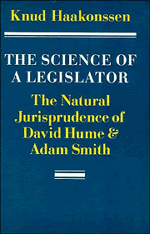Book contents
- Frontmatter
- Contents
- Acknowledgements
- List of abbreviations
- Chapter 1 Introduction
- Chapter 2 Hume's theory of justice
- Chapter 3 Smith's moral theory
- Chapter 4 Smith's theory of justice and politics
- Chapter 5 Smith's analytical jurisprudence
- Chapter 6 Smith's critical jurisprudence
- Chapter 7 Smith's historical jurisprudence
- Chapter 8 Natural jurisprudence in the face of history
- Notes
- Bibliography
- Index
Chapter 8 - Natural jurisprudence in the face of history
Published online by Cambridge University Press: 04 April 2011
- Frontmatter
- Contents
- Acknowledgements
- List of abbreviations
- Chapter 1 Introduction
- Chapter 2 Hume's theory of justice
- Chapter 3 Smith's moral theory
- Chapter 4 Smith's theory of justice and politics
- Chapter 5 Smith's analytical jurisprudence
- Chapter 6 Smith's critical jurisprudence
- Chapter 7 Smith's historical jurisprudence
- Chapter 8 Natural jurisprudence in the face of history
- Notes
- Bibliography
- Index
Summary
The history of law and government which Smith presents was meant to convey some lessons in law which we have already tried to learn in earlier chapters. But at the same time it was undoubtedly meant to, and certainly likely to, give a view of the historical process which would underline the purpose of his whole intellectual enterprise. The question is: what view? The obvious parallels between the three great attempts by mankind to live in commercial societies, in Greece, in Rome, and in modern Europe, may well suggest a cyclical view of history. And this impression is certainly reinforced by the fatalistic notes Smith on occasion strikes. In the Lectures on Jurisprudence he thus prefaces his explanation of how the military government of the Roman emperors came to an end with this remark: ‘We come now to shew how this military monarchy came to share that fated dissolution that awaits every state and constitution whatever’; for ‘this government, as all others, seems to have a certain and fixed end which concludes it’. And in discussing the ‘enormous debts’ which modern governments have contracted in order to maintain their standing armies, he notes that these public debts ‘will in the long-run probably ruin, all the great nations of Europe’.
The problem with such a view is that the cycle has never gone full circle, so to speak, and that the parallels are better seen as contrasts.
- Type
- Chapter
- Information
- The Science of a LegislatorThe Natural Jurisprudence of David Hume and Adam Smith, pp. 178 - 189Publisher: Cambridge University PressPrint publication year: 1981

